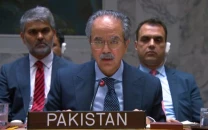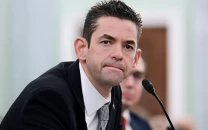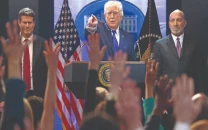Trump team probes possible court martial for 2021 Afghan withdrawal officers
According to NBC report, team considers forming commission to investigate events surrounding the withdrawal
1731840427-0/BeFunk_§_]__-(6)1731840427-0-640x480.webp)
The transition team of US President-elect Donald Trump is reportedly compiling a list of senior military officers involved in the chaotic 2021 withdrawal of US troops from Afghanistan, exploring the possibility of court martials for those deemed responsible for the operation's execution.
According to an NBC News report on Sunday, the team is considering forming a commission to investigate the events surrounding the withdrawal, focusing on whether military leaders should face charges, including treason, for their roles.
The US military's exit from Afghanistan, which concluded a two-decade-long presence in the country, became one of the most controversial moments of the Biden administration.
The chaotic scenes at Kabul's airport, where thousands of Afghans and foreign nationals desperately attempted to flee, raised significant questions about the planning and execution of the withdrawal.
In particular, Republican lawmakers have accused the Biden administration of botching the exit, which they argue led to the rapid collapse of the Afghan government and military.
Trump’s team, which is reportedly spearheaded by Matt Flynn, a former deputy assistant secretary of defense, is examining the actions of key military figures involved in the decision-making process.
The team’s inquiry will focus on how the withdrawal was managed and whether those in charge failed to act with sufficient planning and foresight.
Some officials are even considering the possibility of court martial charges for senior officers if their actions are deemed to have compromised the safety of American personnel or endangered US national security.
The US withdrawal from Afghanistan, which took place in August 2021, followed the Doha Agreement—a deal negotiated by the Trump administration with the Taliban in 2020.
The agreement outlined the terms for the US departure, but its execution led to widespread criticism, especially after the Afghan government and security forces collapsed under the Taliban’s rapid advance.
The Biden administration’s decision to proceed with the full withdrawal and the subsequent events at Kabul’s airport further intensified the political fallout.
During Congressional hearings, former military leaders involved in the withdrawal, including General Mark Milley, the former Chairman of the Joint Chiefs of Staff, and General Kenneth McKenzie, the former head of U.S. Central Command, provided testimony about the operation.
While Milley and McKenzie acknowledged the flaws in the withdrawal, both generals placed some blame on the Trump administration’s 2020 deal with the Taliban.
Milley described the deal as a significant morale blow to Afghan forces, which were left without adequate US support.
He also argued that maintaining a small force of 2,500 troops might have prevented the swift Taliban takeover.
Both generals expressed the view that the US withdrawal had been inevitable, but the timing and execution were critically flawed, particularly in the Biden administration’s handling of the evacuation of civilians and allied Afghans.
Milley and McKenzie criticized the US Department of State for its delayed orders to evacuate American civilians, leading to confusion and perilous conditions at Kabul airport.
Despite differing opinions on who holds primary responsibility, the testimony underscored the bipartisan consensus that the US exit from Afghanistan was marked by strategic failure.
As the investigation by Trump’s transition team progresses, the focus is now on whether military leaders should be held accountable for their actions during one of the most tumultuous moments in US foreign policy.
The push for accountability over the Afghanistan withdrawal also comes at a time when the US is grappling with its broader foreign policy challenges, including ongoing tensions in the Middle East and the growing threat posed by global adversaries.
The outcome of this inquiry could influence future US military policy and the accountability of senior military officers in the handling of complex operations.



















COMMENTS
Comments are moderated and generally will be posted if they are on-topic and not abusive.
For more information, please see our Comments FAQ